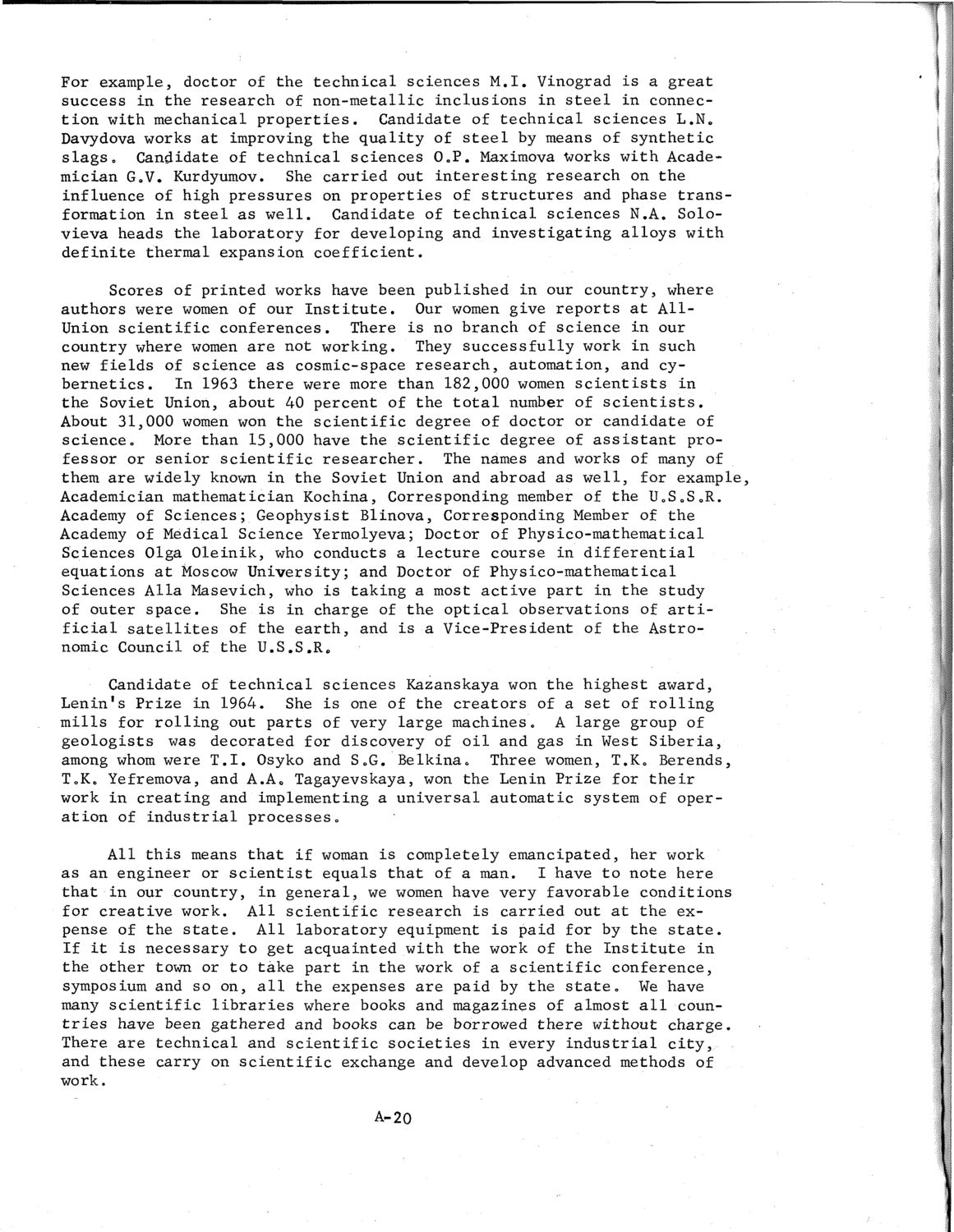| |
| |
Caption: SWE - Proceedings of the First International Conference of Women Engineers and Scientists
This is a reduced-resolution page image for fast online browsing.

EXTRACTED TEXT FROM PAGE:
For example, doctor of the technical sciences M.I. Vinograd is a great success in the research of non-metallic inclusions in steel in connection with mechanical properties. Candidate of technical sciences L.N. Davydova works at improving the quality of steel by means of synthetic slags. Candidate of technical sciences O.P. Maximova works with Academician G.V. Kurdyumov. She carried out interesting research on the influence of high pressures on properties of structures and phase transformation in steel as well. Candidate of technical sciences N.A. Solovieva heads the laboratory for developing and investigating alloys with definite thermal expansion coefficient. Scores of printed works have been published in our country, where authors were women of our Institute. Our women give reports at AllUnion scientific conferences. There is no branch of science in our country where women are not working. They successfully work in such new fields of science as cosmic-space research, automation, and cybernetics. In 1963 there were more than 182,000 women scientists in the Soviet Union, about 40 percent of the total number of scientists. About 31,000 women won the scientific degree of doctor or candidate of science. More than 15,000 have the scientific degree of assistant professor or senior scientific researcher. The names and works of many of them are widely known in the Soviet Union and abroad as well, for example, Academician mathematician Kochina, Corresponding member of the U0S„S„R. Academy of Sciences; Geophysist Blinova, Corresponding Member of the Academy of Medical Science Yermolyeva; Doctor of Physico-mathematical Sciences Olga Oleinik, who conducts a lecture course in differential equations at Moscow University; and Doctor of Physico-mathematical Sciences Alia Masevich, who is taking a most active part in the study of outer space. She is in charge of the optical observations of artificial satellites of the earth, and is a Vice-President of the Astronomic Council of the U.S.S.R. Candidate of technical sciences Kazanskaya won the highest award, Lenin's Prize in 1964. She is one of the creators of a set of rolling mills for rolling out parts of very large machines. A large group of geologists was decorated for discovery of oil and gas in West Siberia, among whom were T.I. Osyko and S.G. Belkina. Three women, T.K. Berends, T„K. Yefremova, and A.A„ Tagayevskaya, won the Lenin Prize for their work in creating and implementing a universal automatic system of operation of industrial processes. All this means that if woman is completely emancipated, her work as an engineer or scientist equals that of a man. I have to note here that in our country, in general, we women have very favorable conditions for creative work. All scientific research is carried out at the expense of the state. All laboratory equipment is paid for by the state. If it is necessary to get acquainted with the work of the Institute in the other town or to take part in the work of a scientific conference, symposium and so on, all the expenses are paid by the state. We have many scientific libraries where books and magazines of almost all countries have been gathered and books can be borrowed there without charge. There are technical and scientific societies in every industrial city, and these carry on scientific exchange and develop advanced methods of work. A-20
| |